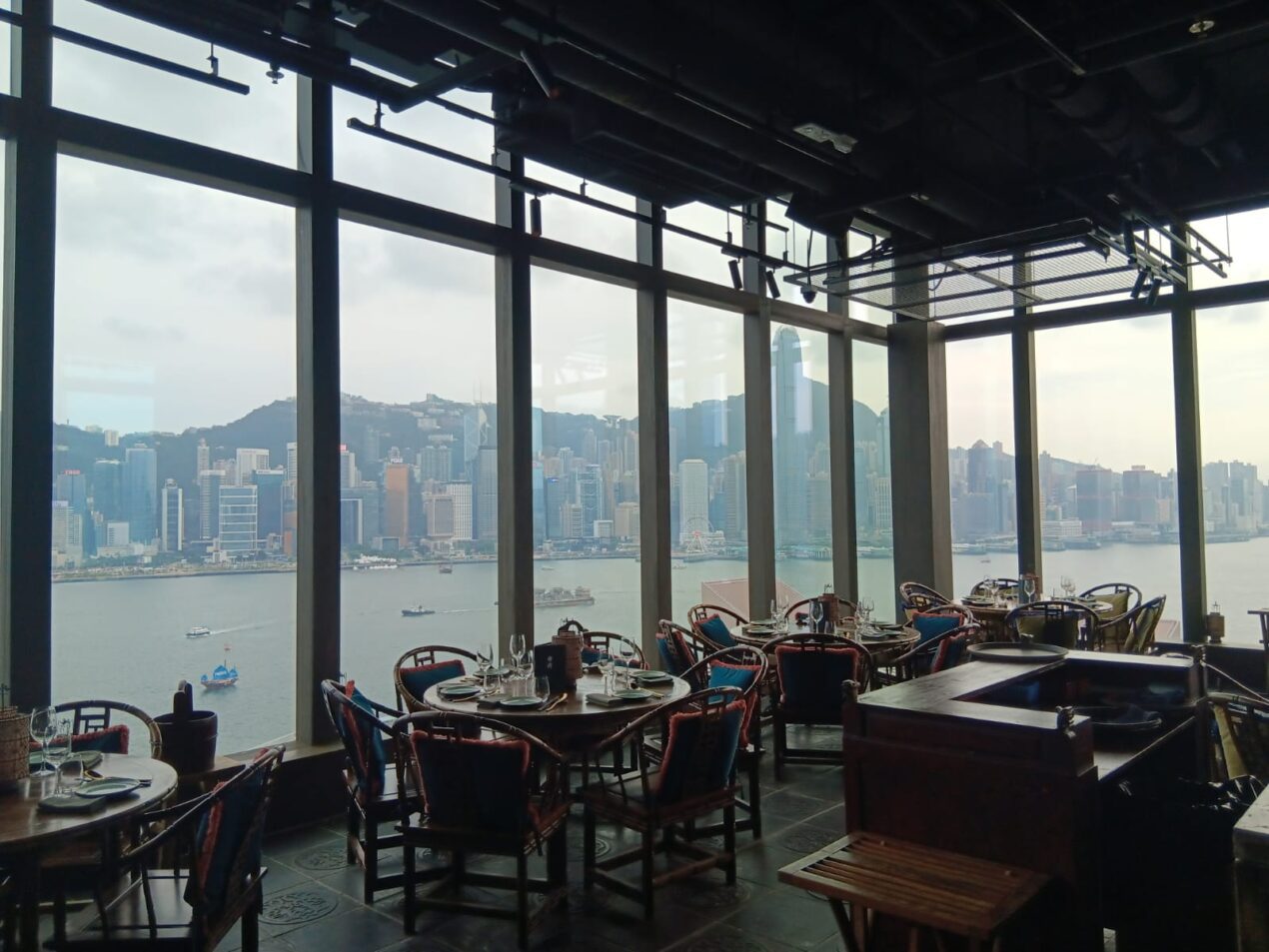Is There Tipping in Hong Kong? Etiquette & Rules Explained By a Long-Term Resident
As an American, the concept of tipping is at the forefront of almost every single interaction. From standard dine-in restaurants to Starbucks and other artisanal coffee shops, taxi drivers, hotels, and even takeout, I fully acknowledge tipping culture has gotten out of control. I was even prompted to tip at a liquor store once after picking up my own booze and paying at the counter. I’m not against tipping but the line is becoming blurred more and more when it comes to requesting a tip vs. what is expected in the ordinary course of one’s job description.
Frankly, America’s tipping culture is a driving reason why I love eating, drinking, and living in Hong Kong – as tipping in Hong Kong has not even come half as close to reaching the ubiquity (or absurdity) it has in the United States. Except for select situations or events, tipping in Hong Kong is not expected – the default rule is that you don’t need to tip in Hong Kong. Tipping just isn’t part of the culture. It is, however, always appreciated.
In my opinion, the only ‘mandatory’ time to tip in Hong Kong is during one specific cultural event and festival – Chinese New Year. However, there are several other key situations where I tip in Hong Kong, which I’ll walk you through below. I’ll also break down several key situations I don’t tip or aren’t typically situations most people tip in Hong Kong.
Having lived in Hong Kong for six-plus years, the below tipping practices and situations are based on my personal experience. I also asked my father (who has lived in Hong Kong for far longer than I have) and friends who grew up here when they tip in the city and incorporated their answers in this post.
Pale Ale Travel Note: I know this may seem like common sense but if you do decide to tip in Hong Kong, I recommend doing so in the local currency, ‘Hong Kong Dollars’ (HKD). I think it’s more widely accepted to tip non-local currencies in countries where their currency is ‘soft’ or deep in the throes of inflation, however, the Hong Kong Dollar is pegged to the United States Dollar (via a self-adjusting mechanism).
When I Don’t Tip in Hong Kong
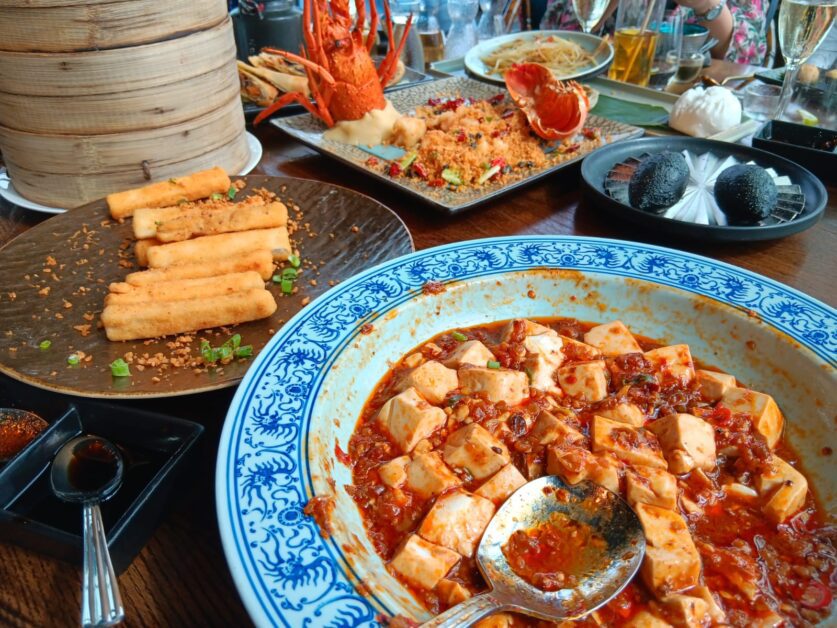
‘Hutong’ is one of my favorite free-flow brunches in all of Hong Kong.
As the general rule is that you do NOT need to tip in Hong Kong, let’s take a look at the key situations where tipping isn’t customary.
Tipping at Restaurants & Bars in Hong Kong
If you’re coming from the U.S. or another country where it’s customary to tip at restaurants or bars, you are in for a good time in Hong Kong. The general rule is that you don’t need to tip at restaurants or bars in Hong Kong.
This is because (theoretically), almost all restaurants and bars include a 10% service charge AND Hong Kong food and beverage workers are paid a base, standard salary that is not reliant on tips. This differs from the U.S. where F&B workers often earn well below the state minimum wage, requiring them to rely almost entirely on tips for their income. Further, a significant portion of the time the tip won’t actually ever end up with the person you gave it to.
Many Hong Kong restaurants also require diners to pay at the entrance and/or a specific counter, and it’s usually a quick transaction where one simply taps their credit card, specific payment app (ex. PayMe), or Octopus card. In cases where one pays with cash at these types of restaurants and receives several coins back from the cashier, most people just leave this.
In Hong Kong, if you head to a popular fast food chain like Fairwood or Café de Coral, you may be looked at funny if you try to leave a tip (especially considering you pay at a designated counter) as this is not customary. This also applies to local Cantonese restaurants like cha chaan tengs (diners), dai pai dongs (outdoor food stalls), and dim sum restaurants (my favorite being Duen Kee out in Tai Mo Shan).
There are slightly more nuanced “levels” to tipping in Hong Kong where it may be “nice” to leave a tip.
Note: When I go to popular seafood restaurants on Temple Street, you’ll sometimes have a ‘dedicated beer guy/girl’ who is in charge of ensuring your beers are tended to, opened, and restocked. My friends and I will typically tip this person as we drink a lot of booze and the dedicated drinks person is definitely running around far more than usual.
When it comes to tipping at mid-range restaurants in Hong Kong, this can vary but it is never mandatory. For example, some Western restaurants may prompt you to tip via their payment gateway when you go to settle the bill, while most Hong Kongese and other Asian restaurants won’t. Once again, a 10% service charge is generally included so it is rare to tip – unless the service was particularly above and beyond.
For high-end and fancy restaurants in Hong Kong, tipping is not generally expected. However, you may consider tipping 10-20% depending on the service. Having eaten and drank my fill at countless brunches, steakhouses, and even Michelin-star spots (no, this is not a humble brag), tipping was rarely on the table. My general rule is unless you receive highly personalized service (such as a sommelier who provides fantastic wine service or a meat carver at Brazilian BBQ), I would refrain from tipping.
If you do decide to tip, it’s customary to tip cash rather than on your credit card.
Pale Ale Travel Note: One of the things that somewhat irritates me in Hong Kong is the Western restaurants that try to play both sides of the card – and like restaurants and bars in the U.S., they are ever-so transparent about it. For example, at spots that charge a 10% service charge, which is most restaurants and bars in Hong Kong, they may also hit you with one of those tablets asking if you’d like to add a gratuity.
Tipping at Cafes in Hong Kong
Hong Kong’s cafe scene and coffee culture have grown exponentially over the years – one that I’m a very satisfied beneficiary of. As someone who consumes enough caffeine on a daily basis to kill a bull elephant, I’ve never encountered a cafe or coffee shop that expected a tip in Hong Kong.
What I will typically do if I snag a coffee at a local cafe is drop my extra change (if I use cash) in the tip jar (if there is one). One of my favorite coffee shops in Hong Kong occasionally gives me a free sample or coffee “on the house,” in which case I’ll drop some HKD into the tip jar as well. And if you go to Starbucks or another major coffee chain (like Pacific Coffee), tipping is definitely not expected.
I am noticing more and more tip jars pop up, especially at larger, Western chain coffee shops and cafes (Starbucks specifically). If I had any confidence in the baristas actually receiving the tip, I think I would be much more inclined to.
Many cafes in Hong Kong also serve food and double as bars, which means that you can expect the standard 10% service charge if you dine in. Therefore, it’s not expected to tip.
Tipping Hong Kong Taxi Drivers
Tipping a taxi driver in Hong Kong is not expected or customary. What is customary though is rounding up the bill. For example, if the fare is HK$77 and I give my taxi driver HK$80, I typically just tell them to keep the change. However, if I were to give them HK$100, I would either take the full amount back or tell them to give me back HK$30.
Hong Kong taxi drivers don’t exactly have the best reputation so I don’t know of anyone who has ever gone out of the way to give their taxi driver anything more than small change they get back.
If you use an app like Uber in Hong Kong, you can choose to tip via the app. However, this is not expected or required. I have tipped my Uber driver in Hong Kong in situations where he or she transported a rowdy group of my friends after a day of free-flow brunch, as I know we may not be the easiest people to put up with after twelve drinks each. I also did have a friend throw up in the Uber and I tipped on the app to cover the cleaning.
Tipping Tattoo Artists + Piercers
As relayed to me by several friends who are tattooed and pierced (having gotten this work done in Hong Kong), tipping tattoo artists and piercers is not expected in Hong Kong – unless you feel that they did an exceptional job. One of my best friends has a sleeve tattoo and let me know that he once tried to tip for his tattoo and had it promptly returned.
I also (semi-recently) accompanied a friend to get her first nose piercing. She did not tip as the total amount seemed to be fairly and adequately “price in everything” (the stud, consultation, aftercare, etc…).
Pale Ale Travel Note: I have several friends who are big golfers and they let me know that at the course they play at, tipping caddies is expressly prohibited as fees already include food and beverage compensation for them.
When I Recommend Tipping in Hong Kong
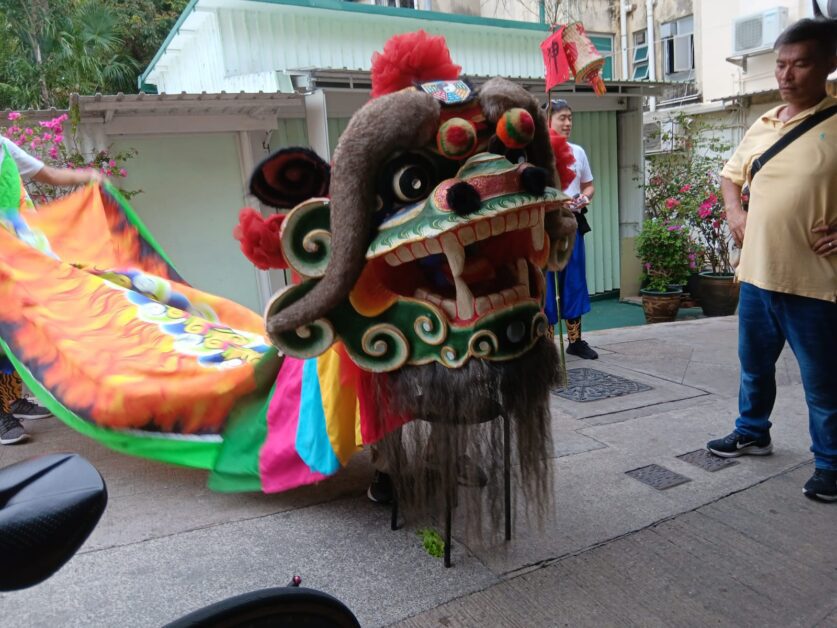
Dragon dances are common during Chinese New Year to bring good fortune to businesses.
Although the default rule is that you don’t need to tip in Hong Kong, I still find myself tipping in more than a handful of situations. Keep in mind that the below situations are NOT mandatory, rather they are instances when I personally tip.
Further, Hong Kong (and Asia) doesn’t subscribe to the idea that a 20% tip should be the norm or bare minimum like the United States. The average tip in Hong Kong is typically around 10% of the bill (or less) – no matter the product or service rendered.
And, while it may seem like there are more situations you “should tip in Hong Kong,” I’d argue that it’s less – as the primary time you’d be expected to tip in the U.S. or other countries where it’s customary is in the food and beverage context.
The below includes situations that aren’t particularly frequent or occur just once a year.
Pale Ale Travel Tip: A lot of the articles written by major banking or money transfer corporations on tipping in Hong Kong don’t seem to have ever visited or lived in Hong Kong and I’ve found that their articles are wildly inaccurate (ex. Wise) – hence I decided to write this post.
Giving a ‘Lai See’ For Chinese New Year
This is across the board. First and foremost, to celebrate Chinese New Year, it IS customary to tip your doorman, security guards, and building cleaning person(s) where you live with what’s called a ‘lai see’ (red envelope). It’s also a wild time of year because you’ll come to find that the one security guard you thought you had suddenly becomes six-plus part-time security guards (who you’ve never seen a day in your life).
This is extremely common in Hong Kong and I typically only stick to tipping my security guard(s) and/or doorpersons that I interact with on a daily basis – including the building cleaning staff. Don’t feel pressure to tip staff that you know are only showing up because it’s Chinese New Year.
Further, elders and married couples typically give ‘lai see’ to younger and unmarried persons. This is also common with bosses and more senior colleagues who may give ‘lai see’ to younger employees or coworkers.
It’s also recommended to give a ‘lai see’ to anyone whose services you use regularly. For me, this includes gym cleaning staff, my 7-11 ladies who I see every day, and the one coffee shop owner who hooks me up with free cold brew and samples. I give anywhere from HK$100 to HK$300, which is on the higher side. However, I don’t typically hand out a large amount of red envelopes for Chinese New Year.
The most common amounts to give are HK$10 and HK$20. Remember, always make sure you give crisp banknotes (a reason why ATMs are drained in the weeks leading up to CNY), and avoid giving an amount with the number ‘four’, as it sounds like ‘death’ in Cantonese. Opt for numbers that include 8, as this symbolizes good fortune in Cantonese and Chinese culture.
Finally, I don’t know if I need to say this but don’t give coins because that’s just a bonehead move.
Tipping a 13th Month For Domestic Helpers
This is very Hong Kong-specific as many families have live-in domestic helpers who essentially run the household and make sure everything runs smoothly. As you may have read in my ‘Pros and Cons of Living in Hong Kong’ article, I have some particular thoughts on how expats and locals treat their helpers and the practice altogether. But I won’t get into those here.
Some employers “tip” and/or provide their domestic helper with a ‘13th-month’ bonus for Chinese New Year, which is one month of the helper’s salary. Others provide another monetary amount of an amount of time off.
I’ll conclude with – treat everyone as if they are human and please acknowledge the hard work that certain groups do. This might seem obvious but there are some very cruel people in this city.
Tipping Food Delivery Drivers in Hong Kong
The most common scenario where I tip in Hong Kong is when ordering food delivery. This is not mandatory as the food delivery platforms have delivery charges and premiums baked into the platform but I generally just find it to be a respectful thing to do. I aim to tip delivery drivers HK$10 to HK$30 depending on the distance they need to deliver and the size of the order.
For example, I will occasionally order groceries on FoodPanda, which will include several gallons of water and various soda waters. This isn’t exactly a light order and requires some muscle, so I err on the side of HK$30 for a delivery like this. Also, when it’s pouring out and I order delivery, I appreciate not having to go out and get drenched so I always tip a bit more (HK$30+).
Tipping delivery drivers and drivers is one of those tipping practices that is divided amongst my friends. I had a buddy who said something I strongly disagreed with about how he doesn’t get tipped at work so why should he tip his FoodPanda or Deliveroo driver? The funny thing is he works in investment banking and gets a bonus every March, which is literally a corporate-sanctioned tip.
It felt like he didn’t self-reflect too thoroughly before making that statement.
Tipping Hotel Staff in Hong Kong
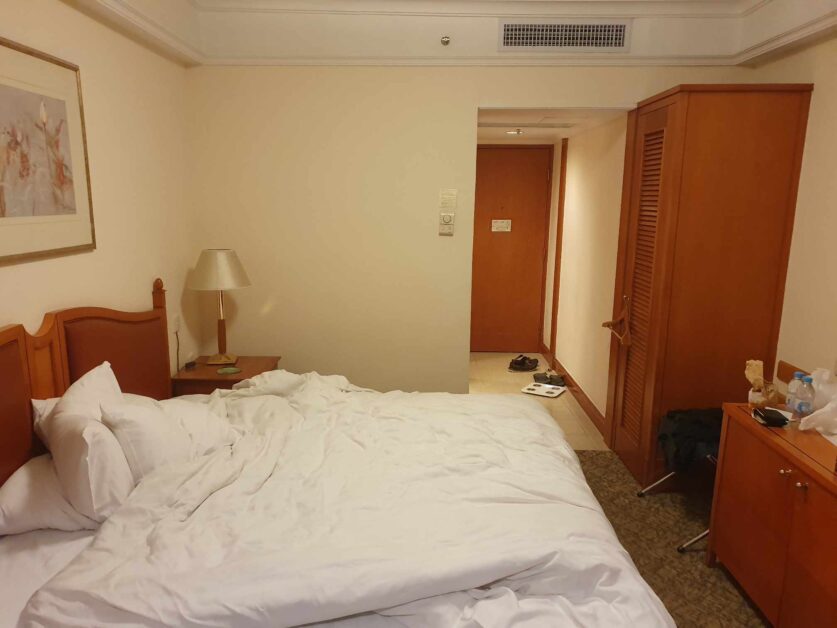
I’m not exactly the neatest person when staying at hotels.
While tipping isn’t required at hotels in Hong Kong, I always strive to tip hotel cleaning staff and bellhops (if they help with my luggage). Room service may also be another situation where you find yourself tipping at a hotel in Hong Kong.
And, if I owned a baller car and required the service of a valet, I would also probably tip them.
As I typically carry my luggage up to my room, don’t order room service, and don’t own a Maserati or Bentley, the only real situation I tip at a hotel in Hong Kong involves the cleaning staff. Anyone who is required to clean my hotel room, change my sheets, and ensure my bathroom doesn’t look like a tornado rolled through has all my respect and then some.
There are several ways I approach tipping housekeeping at hotels.
If I stay for more than one week, I will generally leave a larger tip at the end of the week (ex. HK$100). However, if I am only staying in a Hong Kong hotel for just several days, I will generally just tip HK$10 per day (or stack whatever change I have). I know a lot of people say that you should just tip every single day as you may have a different person cleaning each day, however, I don’t always have small bills on me.
Pale Ale Travel Tip: If you’re looking for a budget-friendly hotel in the city that doesn’t skimp on amenities or comfort (or convenience), make sure to check out my post breaking down the best affordable hotels in Hong Kong.
Tipping Movers in Hong Kong
This was something I semi-recently went through as I moved into a new apartment back in August (I know, that’s nearly one year ago but it was a big move for me). Tipping movers in Hong Kong is (somewhat) customary and it’s standard to tip each mover HK$20 to $HK100 per head, for a full day’s work. If they provided exceptional service, helped move pets, or were required to move a lot of valuable items (and did a great job), you may consider tipping more.
You can also give a larger bill to the ‘foreman’ or ‘head mover’ in the presence of the other movers and make it clear that the tip is to be shared with everyone.
This may go without saying but if you find any of your valuables broken or they were incredibly sloppy while handling your furniture and possessions, I would recommend against tipping.
And, when using popular moving apps like Lalamove in Hong Kong, you can even tip via the app itself (aka adding a ‘Priority Fee’ to your moving order).
Highly Personalized Services in Hong Kong
While I touched on this above in the ‘Restaurants and Bars’ section, I think it’s worth expanding upon. In Hong Kong, I tip at any restaurant where a singular person takes care of me (or my group of friends) the entire night and prioritizes any food or drink that we need.
For me, this is at Braza Churrascaria in Lan Kwai Fong. To give a little bit of context, this is one of those ‘free flow/semi-buffet’ Brazilian steakhouse experiences where an unlimited number of Brazilian cuts of meat are brought to your table until you tell them to stop.
Most times that I have gone to this spot (which is probably more than 30 now), I’ve had the same ‘meat carver’ for 95% of the night and I will slip him HK$100 at the end of the meal, as he will typically circle back with meats that he knows I like more frequently and round up a collection of them at the end of the meal after taking inventory of what I (or my table) want more of.
Other situations that involve highly personalized service may also include times when you go to a fancy restaurant or wine bar and have a sommelier who tailors the food and drink (and experience) to your tastes. I wouldn’t say that this extends to them recommending a single glass or bottle but in situations where you order several bottles and/or expensive bottles of wine. However, it is not mandatory to tip a sommelier. If you do, tipping 20% or more on the final bill is generally the recommended average.
Pale Ale Travel Tip: Curious about how much a trip to Hong Kong might cost? Check out my detailed article answering ‘How Expensive is Hong Kong?’ for a complete breakdown of all major expenses you can expect when visiting!
Tipping Tour Guides
While I’ve never taken a tour in Hong Kong, almost all tour guides in the city rely on tips, so it’s recommended to tip them.
The tipping amount can range from HK$50 to HK$100 (or 10% to 20% of the tour package) or more, depending on the length and quality of the tour. If there are multiple tour guides, I recommend splitting the tips equally.
Tipping at Massages & Spas
Anytime someone has to touch my feet or my unclothed body and has left me feeling exponentially better than I walked in, a tip is in order. This also universally seems to be a situation that most people tip in Hong Kong as it is such a personalized and intimate service.
If the masseuse gave you a crappy massage then, by all means, don’t tip. However, if you are walking out of your massage feeling better than when you came in, I would recommend tipping. The same goes for tipping estheticians and other body grooming technicians in Hong Kong.
The general baseline is to tip masseuses, estheticians, and other technicians 10% to 20% of the treatment price. I generally just tip HK$100 and call it a day.
Pale Ale Travel Tip: If you are curious about two of my favorite massage spots in the city, make sure to check out my post breaking down unique date ideas in Hong Kong.
Tipping Barbers & Hairdressers in Hong Kong
While the general rule is that you do not need to tip a barber or hairdresser/stylist in Hong Kong, I view this as an intimate relationship – one that carries serious implications if things are messed up. I’ve been seeing the same barber for the last four years and rarely ever have to explain what I want done to my hair (a simple shave). Because of this, I always tip my barber in Hong Kong. I take a more Western tipping approach with my barber as it’s one of those things you don’t want to come out looking like one of the Beverly Hillbillies.
When this Big Body gets a fresh haircut, it generally costs me anywhere from HK$250 to HK$300. As mentioned above, I’ve frequented the same barber for four-plus years now and they know exactly what I want. This saves me time and headache, so I always tip my barber HK$100. I imagine for those who do more than just shave their head like me or see a hair stylist, you may want to tip more – as your haircut will also typically be 2 to 3 times this cost.
My barber also used to have a dedicated head washer and I have to say, this guy had me feeling things I had never felt before. I would tip him HK$20 for his heavenly head massage and wash.
From what I hear as well, certain hairdressers and stylists are in demand and may prioritize clients that leave a better tip as well. I imagine 10-20% as a tip should be more than sufficient.
I especially treasure the relationship with my barber because one time I went to a ‘discount barber’ in Wan Chai and they were so careless when cutting my hair that the back of my head ended up completely cut up and began bleeding while I was on the bus home.
Giving ‘Lai See’ at Weddings in Hong Kong
This is one of those ‘tips’ that falls in the grayish area as it isn’t technically a tip but rather a gift that goes to paying for the wedding cost. From my understanding, wedding registries are/were not particularly popular in Hong Kong and Chinese culture, so gifting the bride and groom with a customary red envelope (hongbao/lai see) arose as a way to help them pay for the wedding and the start of their new life.
My general rule for weddings in Hong Kong is that I try to, at minimum, cover the cost of the food and drink that I consume that day (as most weddings will have great food and sometimes free-flow booze). Most say that covering the “cost of the banquet” should be your starting point.
My ‘red envelope’ tipping guideline and range looks like this:
- Acquaintance: HK$500 – HK$1,000,
- Friend or Colleague: HK$1,000 – $2,000,
- Family or Great Friend: HK$2,000+.
Further, make sure that you avoid giving amounts that contain the number ‘four’ as it is closely associated with ‘death’ (due to a similar pronunciation). Hong Kongers are surprisingly superstitious, so it’s important to avoid committing a faux pas like this. Also, avoid giving them used and/or crumpled bills. Always withdraw fresh, crisp bills from the ATM or a teller.
As I mentioned about giving ‘lai see’ during Chinese New Year, if you want to go above and beyond, aim to incorporate the number ‘eight’ into the amount that you give (ex. HK$888) as this is considered a lucky number in Chinese and Hong Kong culture, symbolic of bringing ‘good fortune’.
To be honest, most of the time I’m too lazy to find crisp bills to add ‘HK$88’ to the amount that I give, so I just stick with giving HK$500, HK$1,000, or HK$2,000.
One thing that has caught me off guard at weddings in Asia is oftentimes you will show up with your red envelope and there will be several people sitting at the entrance who take the red envelope on behalf of the bride and groom and mark down the amount and the person in a spreadsheet.
Pale Ale Travel Note: A very random time that I tipped was when I ordered about 20 cinderblocks for my bed and didn’t realize that I checked the ‘dropoff outside’ option when filling out the online form. The delivery driver saw that I was a bit stressed/confused when he was about to leave and then offered to help me carry them up to my apartment. This took roughly 20 minutes, so I tipped him HK$100 for the help as he went out of his way and was under the impression (due to my error) that he was just to leave them at the door.
Frequently Asked Questions About Hong Kong Tipping Culture
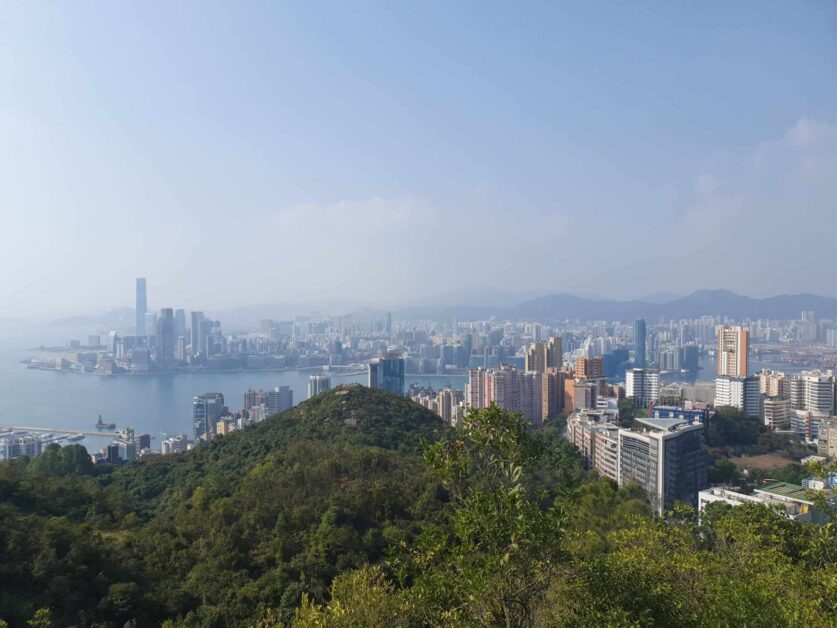
Find me a better skyline in the world. I’ll wait…
Here are a few final questions that several friends and readers have asked before visiting Hong Kong.
Is It Considered Rude Not to Tip in Hong Kong?
Not at all. Tipping in Hong Kong isn’t mandatory as it is generally factored into the costs of goods and/or services that you purchase so it isn’t considered rude NOT to tip. Further, unlike the United States, Hong Kong service staff is typically paid a liveable wage, meaning they do not need to rely on tips just to make ends meet.
Pale Ale Travel Note: I know the term “liveable wage” can be up for debate due to Hong Kong’s wealth disparity but Hong Kong service staff do earn at least minimum wage (unlike some service staff in the U.S. which make under state minimum wage and rely on tips).
How Much Should You Tip in Hong Kong?
Honestly, tip whatever you feel is appropriate in Hong Kong (if you decide to tip_. Basic tipping rules apply. In my experience, 10% of the bill is the average tip amount in Hong Kong.
However, if you feel that someone provided exceptional service and you want to thank them for going above and beyond, provide them with an amount that you feel fairly reflects that. This number could be anywhere from 20% to 50% or more.
Should You Carry Cash on Hand in Hong Kong?
As a general rule, you should always carry cash on hand in Hong Kong. This is going to ultimately make your life easier and prevent any hiccups. I’ve gone through points in my life acting as if Hong Kong were a completely “cashless” society, however, that’s far from a reality.
Hong Kong is a bit of a hybrid when it comes to digital payments and cold hard cash. For example, all major restaurant chains, Western restaurants, and popular Asian restaurants should (for the most part) accept credit cards and other digital payments (such as Hong Kong’s popular contactless smart card or payment apps like PayMe).
And, while over 90% of Hong Kongers use cards to pay for food, services, and goods, it still significantly lags behind Mainland China when it comes to being labeled a ‘cashless society’.
For example, many traditional, storied local restaurants and mom-and-pop shops are ‘cash only’, and Hong Kong taxi drivers (for some reason) remain stubborn and adamant against accepting cash. There are a select few taxi drivers who do accept Octopus.
From my understanding about why traditional and smaller shops/mom-and-mom shops are ‘cash only’, it’s because of (a) the ability to choose how much to report to the government – ex. Under-the-table payments, and (b) merchant and credit card processing fees can significantly eat away at profit.
I estimate that for 80% to 90% of my daily financial transactions, I use my credit card or Octopus card. However, when I take a taxi to meet friends for lunch and/or dinner or crave a pineapple bun or macaroni noodle from a local cha chaan teng, I always load up on cash beforehand. Sometimes, I just get tired of using my card and want to lay off swiping my card, so I’ll pay for small transactions with cash (ex. Buying water or a Coke Zero from 7-11).
Pale Ale Travel Tip: It’s time to put your tipping knowledge to the test. Make sure to check out my posts breaking down my top burgers in Hong Kong and the best pizza restaurants in Hong Kong.
Final Thoughts on Tipping in Hong Kong
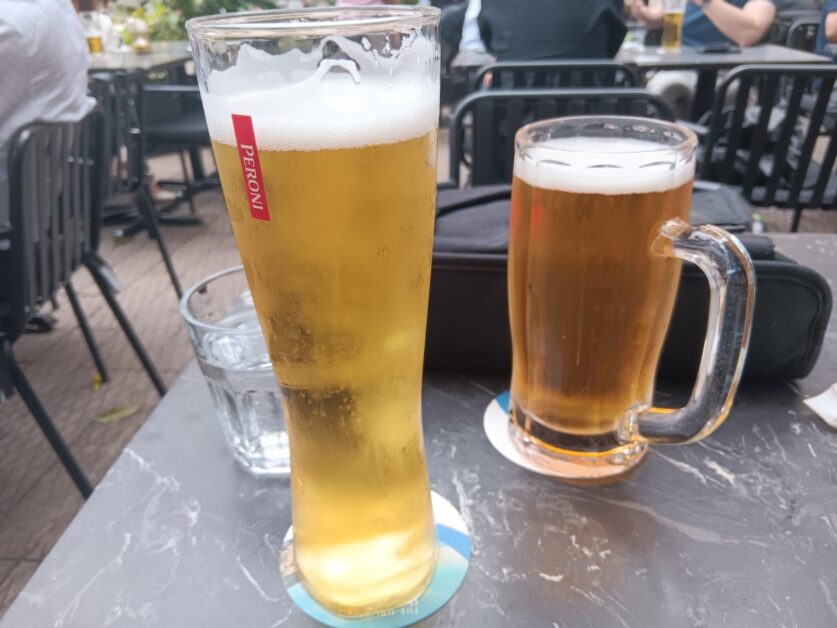
Armoury Terrace in Tai Kwun is one of my favorite spots to grab a beer or Aperol spritz at.
Hopefully the above provides you with a starting point for tipping in Hong Kong. The above is just a little bit of insight into how I approach tipping in Hong Kong but is not mandatory. Tipping is a contentious and polarizing issue that always leads to some heated arguments in my friend groups when out for a big night drinking or “on the town.”
And, when traveling or moving to a new country, it can be confusing what the tipping norm is as I understand you don’t want to commit any social or cultural faux pas.
When in doubt, do as the locals do. Just because your country follows a specific custom or practice doesn’t mean that it applies to the country you are traveling to. For example, when I was living in Osaka, Japan, I left several coins at the Family Mart (as this is somewhat common to do in the U.S.) after paying and when I returned the next day, the staff had saved the USD 0.07 in a plastic bag for me.
What are your thoughts on tipping culture in Hong Kong or Asia? Do you tip and if so, what situations? I’d love to hear from you in the comments. Or, if you have any questions about traveling or moving to Hong Kong, please don’t hesitate to reach out to me via email (info@palealetravel.com) and I’ll do my best to answer your questions.
Stay well everyone,
Big Body
Big Body is a voracious lov…eater, a cowardly fighter, and a self-proclaimed curry goat BBQ-eating champion (don’t forget the donkey milk) who likes Stoicism, baseball, and writing in the third person. Having worked for himself for the last 7 years, he isn’t particularly successful but he does still drink ice-cold Sapporo draft beers with the best of them and knows his way around a Dai Pai Dong or two. He is based in Hong Kong but you can still find him in Saigon, Osaka, and Vienna for extended periods.
